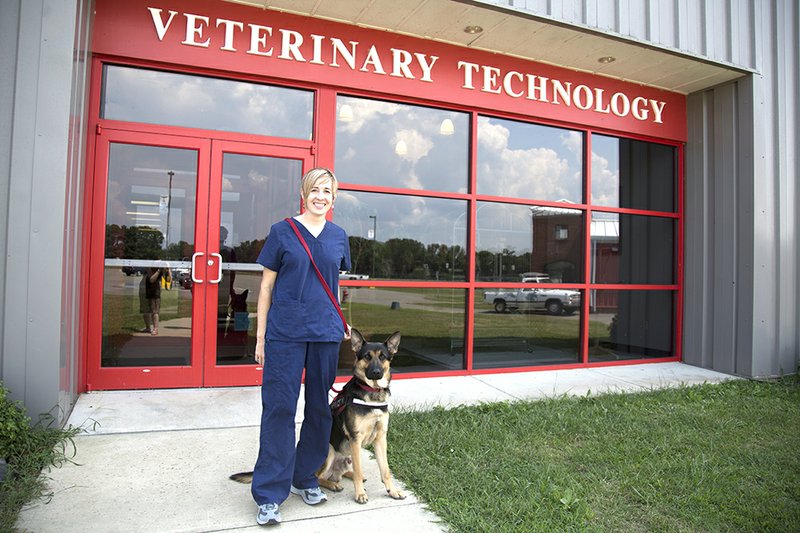Ann Thompson of Greenbrier has always loved animals. She is known by her friends as an animal guru, and she is now formally pursuing her dream of working in a veterinarian’s office through Arkansas State University-Beebe’s veterinary technology program.
While she has bred and trained many animals throughout the years, Thompson has one pet that is much different than any other she has owned. From the looks of him, Levi is just a typical 16-month-old German shepherd, but once his service-dog vest goes on, he is on the job as Thompson’s task-trained medical-alert dog for her mental health and emotional well-being.
“What he does for me on a daily basis is that if he notices my pulse or heart rate or voice, or even my sweat, changes, he will lean into me to get me to an exit, or he’ll jump on me,” she said. “That’s an alert that says to me, ‘You are about to not be doing well.’ That way, I don’t have a panic or anxiety attack.”
Levi also knows when Thompson is having
a bad day that is pushing her to a negative emotional state. He will get on her lap and purposefully position himself to hit the pressure points on Thompson’s thighs in order to release serotonin to bring her back from depression.
Thompson has had Levi since he was 6 weeks old, but she and her trainer did not determine that he would be a service dog until July 2014, when he was several months old. That was when Thompson’s doctors pinpointed her diagnosis, and she decided she did not want to use medication if she could avoid it.
“I asked what were my options other than therapy and talking, and my doctor told me a service dog would help,” she said. “I don’t have $15,000 to $25,000 [for a service dog]. They said that as much as I love dogs and because I’m already a basic obedience trainer, I should start the training and get connected with an advanced trainer. Three times a month, we go to Russellville for classes. We’ve been doing that since October of last year.”
Thompson said like many medical tools, Levi is not always needed but is there when an attack hits. She likened him to her asthma inhaler, which she said is sometimes easier for people to understand.
“I don’t carry an oxygen machine around. My asthma isn’t that extreme,” she said. “I know how to control it, but I always leave home with my inhaler. Will I need it every time I go out? No. But I always have it just in case. Same goes for my service dog.”
Thompson started taking classes in ASU-Beebe’s veterinary technology program this semester, and she said it has been an exciting step in her journey of working with animals. She already has a small business called Liberty Acres, in which she boards animals, trains dogs and produces all-natural pet-care products, and she said it was time for her to add some medical training to her current skills.
“Dr. [J. Mark] Baker in Rose Bud has been my vet for over 20 years, and he has encouraged me from the first day I knew him,” Thompson said. “I went and saw him this past spring. We hadn’t seen each other in about four years, and I said I’d still like to go to vet tech school, but I wasn’t sure what exactly to do. He told me I should check out the Beebe program. Ten years ago when he first mentioned it, he said it had just started, and everyone was holding their breath. This spring, he told me he had two ladies from the program working with him, and he couldn’t recommend anything better.”
After doing a little of her own research, Thompson applied to ASU-Beebe and to the program. She said she was starting to get nervous when it was time to register for classes. She had been accepted to the school, but word about her acceptance to the program was still in limbo. Finally, she got the good news that she was going to be part of the vet tech program, and the long wait was so program directors could accommodate her and Levi.
“They had never had a student with a service dog,” she said. “They had to add to the policy manual for the program in order to handle a student with a service dog. We are dealing with animals. We are dealing with live viruses. These are all things they needed to look at. … We came up with a grand program. When I’m in vet classes, he’s in his own little suite where he can sleep, eat and drink. Then he goes with me to my other classes and just sleeps under the desk.”
Thompson said Levi, like most service dogs, is so well-behaved that he is hardly noticeable in class. For the first few days of school, she arrived early with him and got him settled down before other students arrived. When she got to class on time instead of early one day, the other students were shocked to see a dog in tow.
There are certain things Thompson said she thinks everyone should know before interacting with someone who has a service dog. First of all, when a service dog has its vest on, the dog is working and should not be interrupted by people calling, beckoning or petting it. Thompson said it is important for people to respect both the dog and the person.
“I’m a normal person,” she said. “Walking down this road has been very humbling for me. I’m to a point where I am much healthier, and now I can be a voice, a front-runner, and educate people and give confidence to others who have service dogs.”
